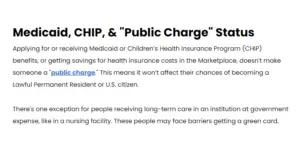Are you concerned about how receiving Medicaid or CHIP benefits might affect your immigration status under the Public Charge rule? Let me reassure you: generally, applying for or receiving Medicaid or Children’s Health Insurance Program (CHIP) benefits, or getting savings for health insurance costs in the Marketplace, does not classify someone as a “public charge.” This means it won’t negatively impact your chances of becoming a Lawful Permanent Resident or U.S. citizen.
Understanding the Public Charge Rule and Medicaid – What is the Public Charge Rule?
The Public Charge rule is a term used in immigration law to refer to individuals who are considered primarily dependent on the government for subsistence. This could potentially affect their immigration status. However, most forms of Medicaid and CHIP are not included in this definition.

How Does Medicaid Affect Public Charge Assessment?
Receiving Medicaid benefits, in most cases, does not make you a public charge. This includes savings for health insurance costs in the Marketplace.
One exception is for those receiving long-term care in an institution at government expense, such as a nursing facility.
The 2022 Public Charge Ground of Inadmissibility Final Rule
Under the 2022 Final Rule, the public charge inadmissibility determination is based on a totality of circumstances. This means all relevant factors are considered, and no single factor (except for an insufficient Affidavit of Support, where required) is decisive.
Key Exemptions and Clarifications – COVID-19 and Public Charge
Public benefits related to the COVID-19 pandemic, including vaccines, do not count towards public charge determinations.
The government encourages everyone, regardless of immigration status, to receive necessary medical care, including COVID-19 vaccines.
Categories of Noncitizens and Benefits Eligibility
There are specific categories of noncitizens who may be eligible for certain public benefits.
These include lawfully present children, pregnant women, and certain noncitizen members of federally recognized Indian tribes. The use of these benefits does not automatically make them subject to public charge considerations.
Seeking Help and Clarifications – Trusted Resources and Assistance
For accurate information and assistance, it’s crucial to seek help from reliable sources. You can visit the official USCIS website or contact local government agencies. Also, you can check out the Social Security Administration for information on Supplemental Security Income for Noncitizens.
Professional Assistance
If you’re unsure about your specific situation, consulting an immigration attorney or a legal aid organization can be helpful. They can provide personalized advice and guidance on how the public charge rule might affect you.
Conclusion
So, how can you connect to Medicaid and other health benefits without worrying about the Public Charge rule? In most cases, you can safely apply for and use Medicaid or CHIP benefits without it affecting your immigration status. However, always verify your eligibility and consult trusted resources if you have concerns.
If you do have more questions regarding the public charge, you can either visit the U.S. Citizenship and Immigration Services website or contact any of the immigration attorneys here in Houston to provide you with a better understanding.
Nick Bryant is the author of Understanding Healthcare Is Half The Battle and a Senior Counselor with 13+ years of experience working in community health and mental health. He enjoys spending time with his family, watching WWE on Friday nights, and working toward a Google Data Analytics certification. If you have additional questions about community resources or government assistance programs, simply leave a comment below and he will follow up as soon as possible.

